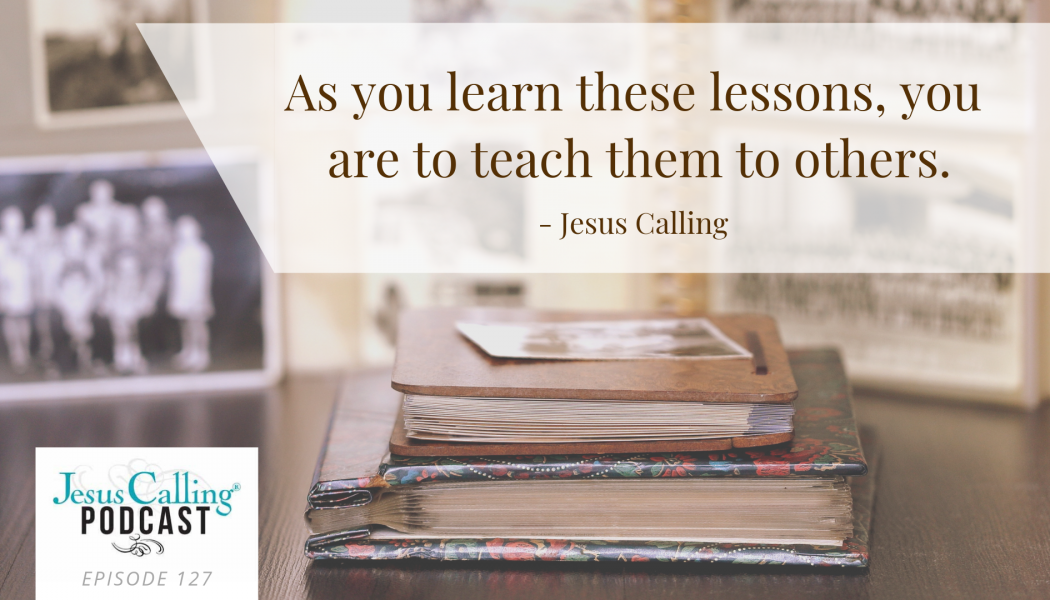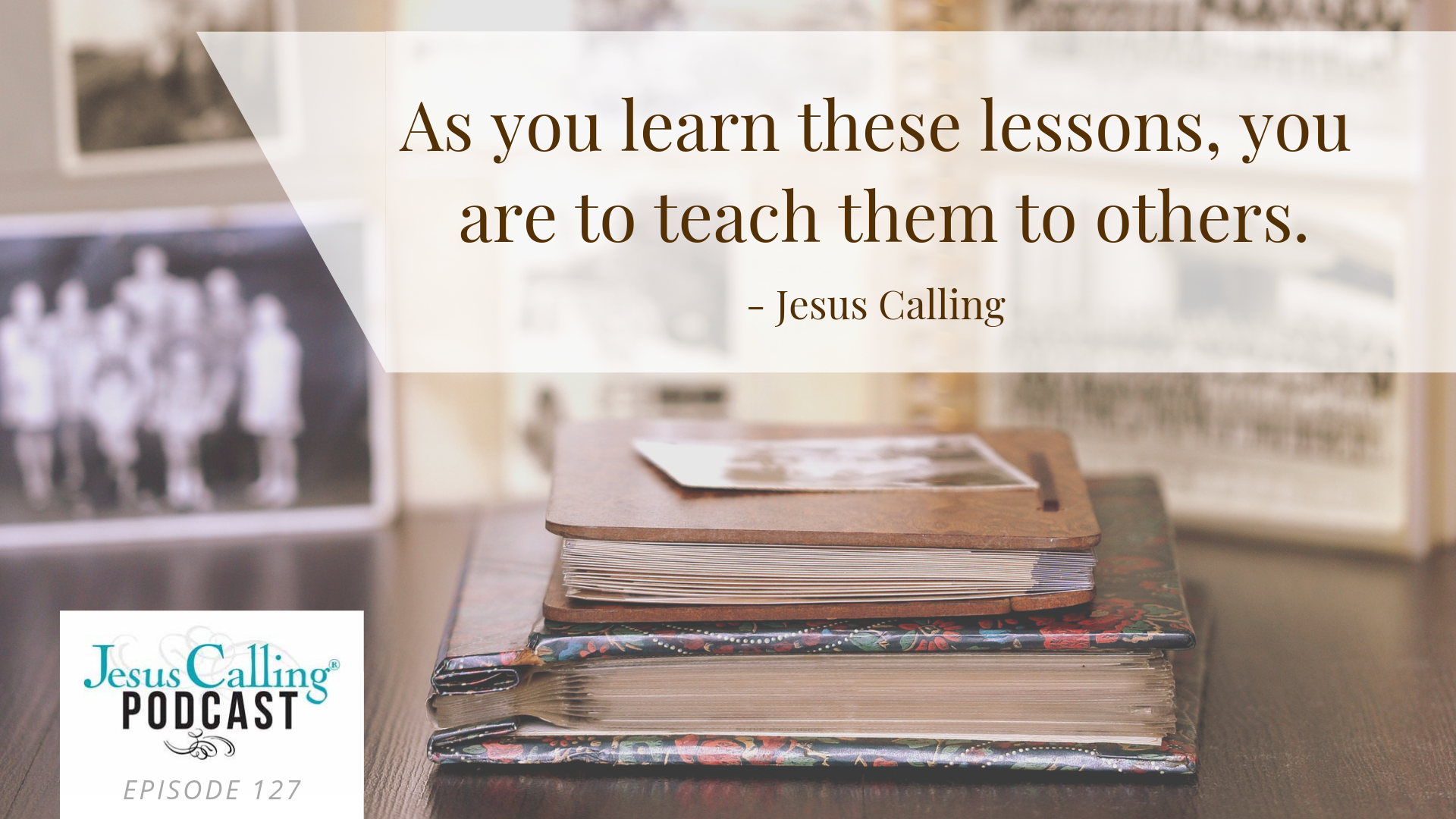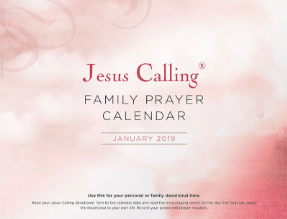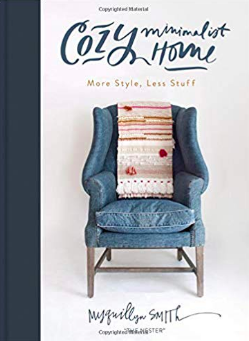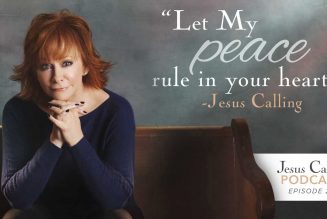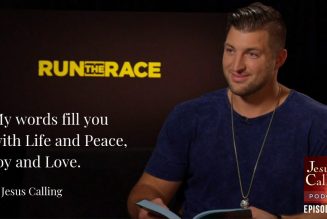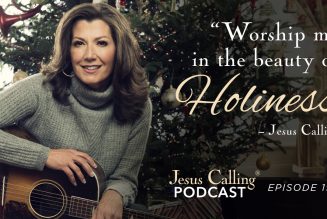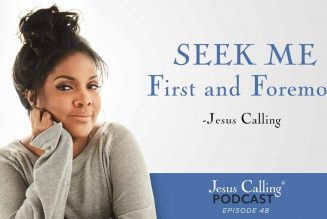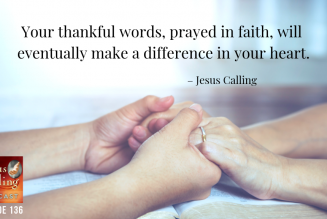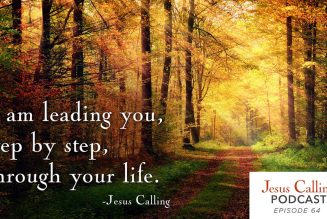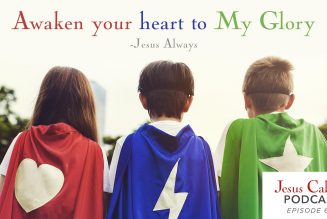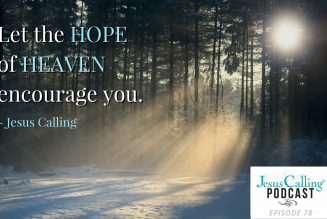Will Graham, grandson of Billy Graham, and Myquillyn Smith have been blessed with rich family legacies, and honor the values and lessons they’ve been taught from previous generations. Today, Will Graham is the vice president of the Billy Graham Evangelistic Association. Although he grew up under the legacy of his grandfather, Will was given freedom to follow any path he chose. Will shares what it was like growing up in the Graham family, about the winding path he followed as God led him to serve in his family’s ministry, and some stories from his first book, Redeemed: Devotions for the Longing Soul. When Myquillyn Smith grew up, she learned to embrace home as a place where rest, creativity, and hospitality could flourish. And for the past ten years, Myquillyn has been encouraging women to embrace their home—imperfections and all—on her blog, The Nester, and now in her new book Cozy Minimalist Home. Today Myquillyn tells us how she began to let go of perfection and be content with what she has, right where God put her, and how she’s been able to use her home to connect with others.
Will Graham: I love God’s word and God’s Word changes lives. It’s not Will Graham, it’s not Billy Graham, it’s not Franklin Graham. It’s God’s Word, the Bible. That’s what can change lives. That’s what speaks into our heart. Christ comes into us and makes as a whole new creation. That’s a miracle. And I get to see that so often because I’m on the front row. Literally on the stage, I’m watching everybody down there give their life to Christ. That’s a miracle, and I’ll never get tired of that.
“It’s God’s Word, the Bible. That’s what can change lives.” – Will Graham
Living Out a Family Legacy: Will Graham & Myquillyn Smith– Episode #127
Narrator: Welcome to the Jesus Calling Podcast. Today’s guests have been blessed with rich family legacies, and honor the values and lessons they’ve been taught from previous generations: author and pastor Will Graham, and writer and decorator Myquillyn Smith.
First up, Will Graham is the grandson of the legendary minister Billy Graham, and the vice president of the Billy Graham Evangelistic Association. Although he grew up under the legacy of his grandfather, Will was given freedom to follow any path he chose. Will shares what it was like growing up in the Graham family, about the winding path he followed as God led him to serve in his family’s ministry, and some stories from his first book, Redeemed: Devotions for the Longing Soul.
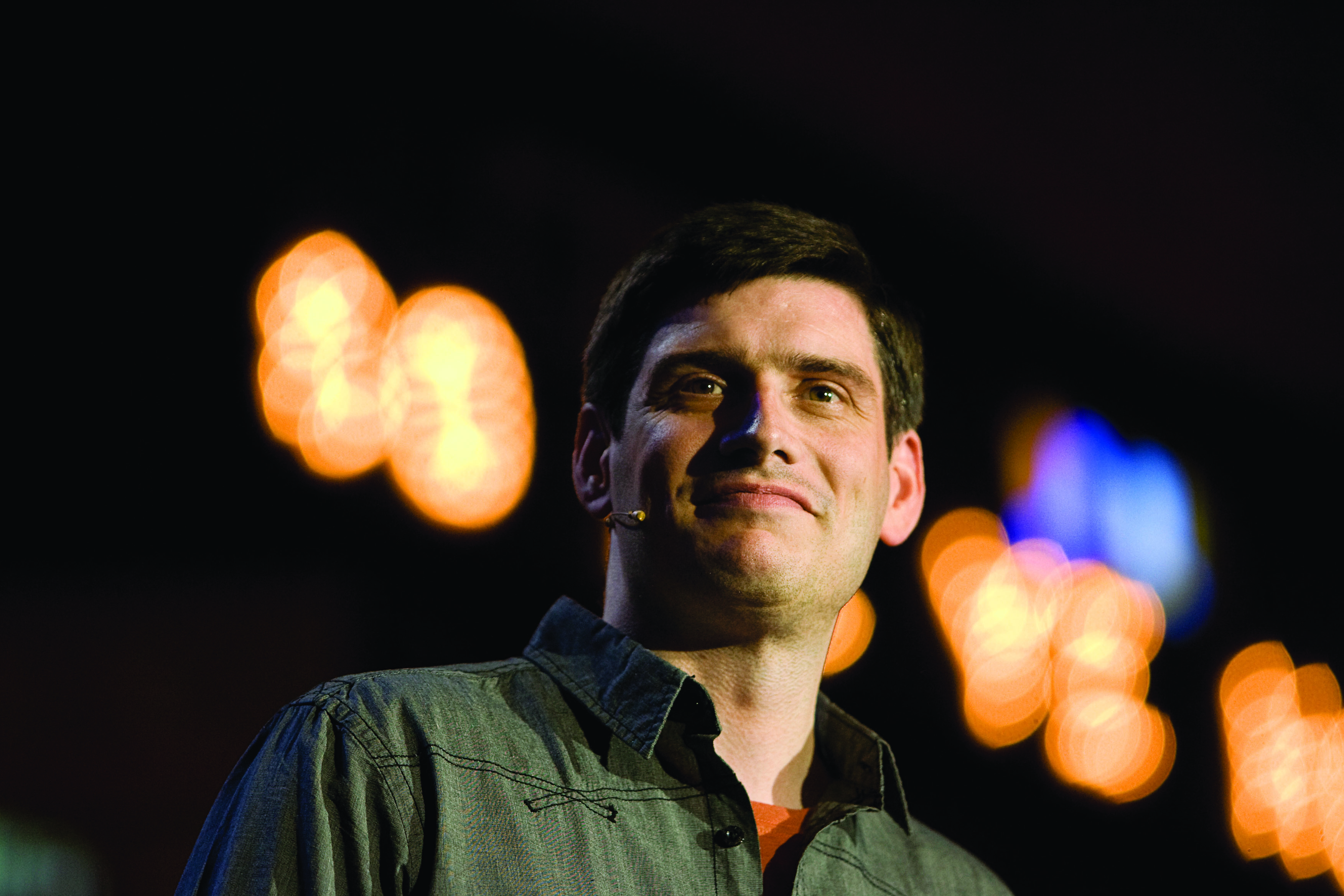 Will Graham: My name is Will Graham. And I’m the oldest son of Jane and Franklin Graham, which means my grandfather’s Dr. Billy Graham.
Will Graham: My name is Will Graham. And I’m the oldest son of Jane and Franklin Graham, which means my grandfather’s Dr. Billy Graham.
I guess one of the most interesting things is my grandfather and I, we have the exact same name. He’s William Franklin Graham, Jr. My father’s William Franklin Graham III. I’m William Franklin Graham IV. My son’s actually William Franklin Graham V. But we call him Quinn—Quinn means “five.”
So if you’re tired of our name, I’m sorry. That’s just what’s happened. There’s been five generations of us, so it’s it’s now my son’s problem. If he wants to pass on the name, that’s his deal. It’s up to him—I’ve done my part. I passed the name on and gave him the name. He’s a good boy.
Growing Up in the Graham Family
I grew up in the mountains of western North Carolina, a community called Boone, which was home of Appalachian State University. Matter of fact, that’s what actually brought my family to Boone. My father had to go back to school, or at least finish school.
He got kicked out of multiple schools, never did well. And after he got married and I was born, he decided to get serious about [his education.] I’ve got a family depending on me.
And so his parents said, “We’ll still pay for college if you go.” He wanted to make sure that he still had Mom and Dad paying for that bill because he couldn’t afford it as a new parent.
We grew up on a farm. We didn’t have any cows. We had a few horses. We had a potbelly pig. We had roosters. We had a pet raccoon, cats, gerbils, hamsters. I mean, we even had a parrot.
We had acreage, so we rode motorcycles everywhere we went. We loved to ride motorcycles—that’s one thing I always want to be was a professional motorcycle racer. I love riding, so soon as I got home from school, I would ride and ride and ride until I ran out of gas. I’d tape flashlights to my motorcycle so I could keep going.
I went to a public high school. You know, no one treated me any different. No one my age really cared who your granddaddy was. They cared more if you had the latest Nintendo game—back then it was Nintendo. They were more worried about, “Can he score a goal in soccer? Can he help the team win?” more than anything else.
I pretty much lived in the mountains my whole life, except for a small stint when I went to Liberty University and then went down to Southeastern Baptist Theological Seminary, down in Wake Forest, North Carolina. My [higher] education is about the only time out of the mountains.
And in 2006, I left my local church in Raleigh and then came and helped my dad. My dad said, “I want you in Asheville, North Carolina,” which was great because all my grandparents at this time were still alive. I was 31 and still had four living grandparents. So I get to spend the last the last few years of my grandparents’ life with them. They were in Montreat, North Carolina, right down the road from where I live.
And we grew up in a Christian home. Mom and Dad had just become Christians. They were, in a sense, baby Christians right before they got married. And so their Christian faith was still developing then. They knew a lot about the Bible. They knew a lot about God. But personally they never allowed God to transform their lives.
“[My parents] knew a lot about the Bible. They knew a lot about God. But personally they never allowed God to transform their lives.” – Will Graham, describing the faith of his parents early in their marriage
They believed in God. They trusted in God. They started instilling God’s Word into us. At a young age, we started memorizing scripture, we were having Bible studies at night, reading the Bible together. And I’m very appreciative that.
I’m so thankful that my dad told me about Christ. One of the greatest things that we can ever do is to tell our children about Christ. Don’t don’t expect a Sunday school teacher, don’t expect a friend or a pastor to do it. You need to do it. Lead your child to Christ.
“One of the greatest things that we can ever do is to tell our children about Christ.” – Will Graham
Preparing for a Life in Ministry
People often ask me, “So Will, when did you decide to get into the family business? You know, when were you going to fall into your granddaddy and your dad’s steps?”
I think when my first memories I had was teacher said, “Draw a picture what you want to be.”
All the guys you like Joe Montana football helmets or Dan Marino helmets. But for me, I drew a picture of an open Bible and a pair of David Clark headsets. These are what aviators use and so they were earmuffs with a microphone on. I drew that because I wanted to fly around and tell people about Jesus. Basically, I want to be like my dad. My dad was a pilot. That’s where I saw those David Clark headsets, on his head.
Then later on I went to Liberty University, and I think God was preparing me for ministry there. I knew that God had called me to ministry, I still didn’t know what.
God still hadn’t revealed what I was supposed to be doing. So I said, “Well, get some more education.” I went to seminary at Southeastern Baptist Theological Seminary, right outside of Raleigh, North Carolina.
And it was during that time that God led me to talk to a pastor. And he said, “Will, the BGA—the Billy Graham Evangelistic Association, the BGA—you guys always worked through local churches?”
I said, “We always work through local churches. We believe in the local church. We’re not the local church, but we want to assist the local church in evangelizing people.”
He said, “Does Samaritan’s Purse work through local churches?”
I said, “Absolutely. Samaritan’s Purse only works to local churches. So when we’re handing out all those shoe boxes for Operation Christmas Child, they’re always done through the local church.”
So he said, “Well, shouldn’t you know how local church works, then, if you’re going to go work at Samaritan’s Purse or the Billy Graham Evangelistic Association?”
I said, “Hmm, you’ve got a point there.”
He said, “Let’s do an internship. You’ll work six months. If you like and we like it, we’ll do it for another six months.
And I really didn’t want to. But I was like, “You know what? This makes sense.”
I start working at the church for six months, and about eight years later I was still there. They had me pastoring a church plant.
And so I became a pastor in those eight years. I really loved it, and God changed my heart in it.
Walking in His Grandfather’s Shoes on the Big Screen
I had one the one of the greatest opportunities: to play my grandfather in Unbroken: Path to Redemption, which is the second half story of Louis Zamperini. He is one of the most incredible people I’ve ever read about in my life. I never got to meet him personally. He died before I got to meet him, but man, what a story.
[embedded content]
[Louis’s life is told in] an incredible book written by Laura Hillenbrand. I remember reading this on my way to India at the time, and I was so fascinated with this book. I couldn’t believe it. I mean, this is an incredible story. I just kept reading it, and I didn’t watch the movies on the plane. I just kept reading this book. I was captivated by it. And I knew that he would come to know Christ because I heard about his stories many times from my grandparents.
“I knew that [Louis] would come to know Christ because I heard about his stories many times from my grandparents.” – Will Graham
So then when the movie came out, the first movie, Unbroken, a lot of Christians—including my own family—they said, “They didn’t tell the whole story,” because [the first movie ended] with Louis coming home and hugging his mom and dad, which is true. The whole movie was good, except they didn’t finish the story. That’s when Louis’s life started coming off the tracks.
Now, in all fairness, the producer Matt Bair was trying to get the full story in. The problem was the movie was already two hours long. It couldn’t go any longer.
It was such a successful movie, then Universal came back and said, “You know what? We’ll do the second half of the story now. And you can do that whole 90-minute movie just on his conversion.”
And so we got the best of both worlds. We got to spend two movies talking about Louis Zamperini and what God did in his life.
![Louis Zamperini and Billy Graham at the 1949 Los Angeles Crusade where Zamperini made a life-changing decision for Christ. [courtesy of billygraham.org]](https://s32213.pcdn.co/wp-content/uploads/2018/12/Screen-Shot-2018-12-22-at-10.48.40-AM.jpg)
And so it took place at the 1949 Los Angeles Crusade. And for those who do not know, this would be the most pivotal crusade in my granddaddy’s life. He called this a watershed moment. This was his defining moment in life, the 1949 Los Angeles Crusade. And that’s when Louis Zamperini would come to know Christ and would give his life to Christ.
He hated my granddaddy. He did. He hated preachers. He hated God. He said, “Why should I thank God for being a drunk? Why should I think God let me be tortured by the Japanese? Why should I thank God for taking away my ability to run?” Because he had broken his leg and he just couldn’t run like that anymore. He was one of the fastest humans of all time, and he had a lot of the records and they were just recently broken not terribly long ago. But he held the records for so long, and he never got to race in his prime. World War II broke out in his prime years, and his body, because of his being beaten and starvation destroyed his body, he would never be 100-percent again. And he tried and his leg broke and his running career came to an end.
So he didn’t like anything to do with God. He went to get away from God. His wife Cynthia said she went by herself, gave her life to Christ. She was going to divorce Louis because Louis was a drunk, and he knew it. And then but when she came back and said, “Louis, I’m not going to divorce. I love you and God doesn’t like divorce. And we’re gonna get through this together.” Well, that just all sudden that softens his heart just a little.
She said, “Will you come with me?”
“Fine, I’ll come.”
And he would go. He heard my granddaddy. He hated everything he heard, walked out the back.
So by next week, she finally talked to him going one more time. And so he came forward. He heard the message. He hated everything he heard. He got up to walk out. But instead of his feet letting him go out, his feet went the other direction and made him walk forward. He’s like, “I don’t know how I found myself at the front. I’m sitting there, and I’m bawling.” And he realized that Christ had gotten him through all that suffering in life to this one point. And he fell in love with Christ that day. His sins were forgiven. His life was forever changed.
“[Louis] realized that Christ had gotten him through all that suffering in life to this one point. And he fell in love with Christ that day. His sins were forgiven. His life was forever changed.” – Will Graham
And now I get to play in the movie that portrays this great change of life, and I got to play the role of my grandfather? That’s pretty cool.
I asked the producer Matt, “How many people get to actually play their relative in a movie?” And we could come down with two other people. So that was pretty special.
And I’m preaching the same message. All my words in the movie, every word I say is from my granddaddy’s 1949 Los Angeles Crusade sermons. So I think we used about three or four of his sermons, just pieces of it.
We’re filming it in Pomona, California, right across from Cal Poly. And when I’m preaching this sermon, I’m thinking to myself, The last time the sermon has probably ever been heard was in 1949. And I’m preaching it again here in California about 30, 40 miles as the crow flies from where it actually was first heard. And that gave me chills.
My granddaddy always wanted Louis’s life to be in a major movie. So he would have been proud of this great movie about Louis’s life. And I think he’d been real appreciative.
He knew that I was in the movie, but he didn’t get to see it. He passed away during the editing process, just like Louis did. Louis died during the editing process of the first movie. And so neither one get to see the final product.
From 1949 until they died, they were lifelong friends. Now Louis would die a few years before him, but they would spend their whole life as good friends, writing back and forth. They never forgot one another and always were appreciative to another, always good friends.
Sharing Family Stories in Will’s First Book, Redeemed
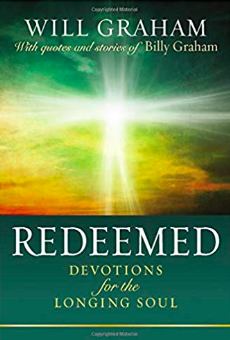 Narrator: Recently, Will wrote his first book, a collection of devotions and stories called Redeemed. Through stories from his own life, and other stories passed on from family and friends, Will can trace how God is working in people’s lives.
Narrator: Recently, Will wrote his first book, a collection of devotions and stories called Redeemed. Through stories from his own life, and other stories passed on from family and friends, Will can trace how God is working in people’s lives.
Will Graham: I’m a storyteller. I like telling stories, if you can’t tell. I guess I get that from my grandparents, both my grandparents.
It’s just a collection of stories. Most of them were my story, some were my granddad’s stories. But most of my stories. They were recollections I had, things I got to see. A couple in there, these are stories I heard about from my granddad. But I wanted to share these things were I saw work in a unique way. And I saw God do something supernatural.
These aren’t stories about Will Graham, they’re not stories about Billy Graham. Granted, they are things that we’ve seen, so there’s more there in a sense, but we’re seeing God. We’re seeing God change as we’re seeing God speak to people. And so these are God’s stories.
I believe that if God’s not the hero of your story, then your story is not worth telling. In all honesty, God’s to be the hero of every story. And so I want to show how God showed up in people’s lives. God saved marriages. God did supernatural things. I want to share that with people and how that can apply to their life today.
“I believe that if God’s not the hero of your story, then your story is not worth telling.” – Will Graham
And what’s interesting, I did this before my granddaddy passed away.
We had already finished [the book and] submitted it. It was here at the publisher when February 21st came, which is the day that my grandfather passed away from this earth and moved into heaven. And so during that time, I had to go back and rewrite some of my chapters because I had my granddaddy in present tense. I had to go back, and that was sobering. I miss my granddaddy, but when you have to go back and change things because he’s not here anymore and you just finished it, it was like, Oh, I have to make these changes. I wasn’t sad because it changed my book. Just the fact that you’re putting your granddaddy from present tense to past tense. So that was a bit tough. But it was a great privilege to write the book, and I’m so grateful I had the chance to write it, and I hope that God will give me a chance to write more books.
My granddaddy used every possible means to proclaim the Good News of Christ. My grandfather, he was on radio—that was this first thing. He would end up going by national radio like ABC, NBC radio, which is an incredible story on its own. He would also [be on] television. He would do satellite television. He would do live television. He would do internet. He wrote books, lots of books. He wrote a lot of periodicals.
There was a great story that my granddaddy went to China. It was the first time he’d ever gone to China, because China had been closed for years to outsiders. This was in the late ‘80s. My grandmother grew up in China. She was born in China, raised in China. Her parents were medical missionaries, and so China was home to her.
China says, “Okay, we’ll let Billy Graham come over, and he can preach in a few churches. That’s it.” So he came over to preach in a few churches, to see where my grandmother was born and raised.
So they’re taking a little boat ride down the canal, and all these people were coming out. They’re all waving, and Granddaddy’s waving back and he said, “How did these people know who I am? It’s not like I’m Christian newspapers over here.”
And my grandmother just leans forward. “Bill, they’re not waving at you.” They were waving at her. In that way, my grandmother kept him humble.
Celebrating God’s Work in Our Lives
A lot of people know about Billy Graham Crusades. My father has Franklin Graham Festivals. Will Graham has Will Graham Celebrations.
We’re here to celebrate what God is doing in people’s lives. And so we just use the word celebration. And that’s what it is. I celebrate changing of life from that which is once dead now made of life. That’s something to celebrate. And so that’s where we kind of used the name.
There’s nothing much different. I tell people the biggest difference is the color of the hair the preacher. And mine’s turning gray quick—but it’s less gray than my dad’s, and it was a lot less gray than my granddad’s.
When people come to evangelistic meetings, whether it’s crusades, festivals or celebrations, doesn’t matter what generation, they’re all the same. They’re exactly the same. There’s no differences. People still looking for purpose. They’re still looking for joy. They’re still looking for meaning in life. They still have family problems, they have personal problems, whether it’s addictions.
There’s nothing new under the sun. The Bible tells us there’s nothing new. All these things are the same. Looking for belonging looking for relationship, looking for meaning.
Nothing’s changed. It comes in different forms today.
That’s why the Bible message still transcends all cultures, all times, doesn’t matter. My granddaddy’s preached it. I preached it, my dad’s preached. It spans multiple generations. My generation is a lot different than my granddad’s generation, when you just think of the world that we live in today. But the same basic needs still apply. They just look different, but the needs are still there.
Narrator: You can find Will’s book, Redeemed: Devotions for the Longing Soul, at your favorite book retailer today!
Stay tuned to hear our next guest, author and decorator Myquillyn Smith, after this brief message about a free offer from Jesus Calling.
Download this FREE Jesus Calling Daily Prayer Calendar which works with your Jesus Calling devotional. Each day begins with a guided reflection followed by space for prayers of thanksgiving and special requests.
Narrator: Our next guest is author and decorator Myquillyn Smith. For the past ten years, Myquillyn has been encouraging women to embrace their homes—imperfections and all—on her blog, The Nester. Today Myquillyn tells us how she began to let go of perfectionism and be content with what she has, right where God put her, and how she’s been able to use her home to connect with others.
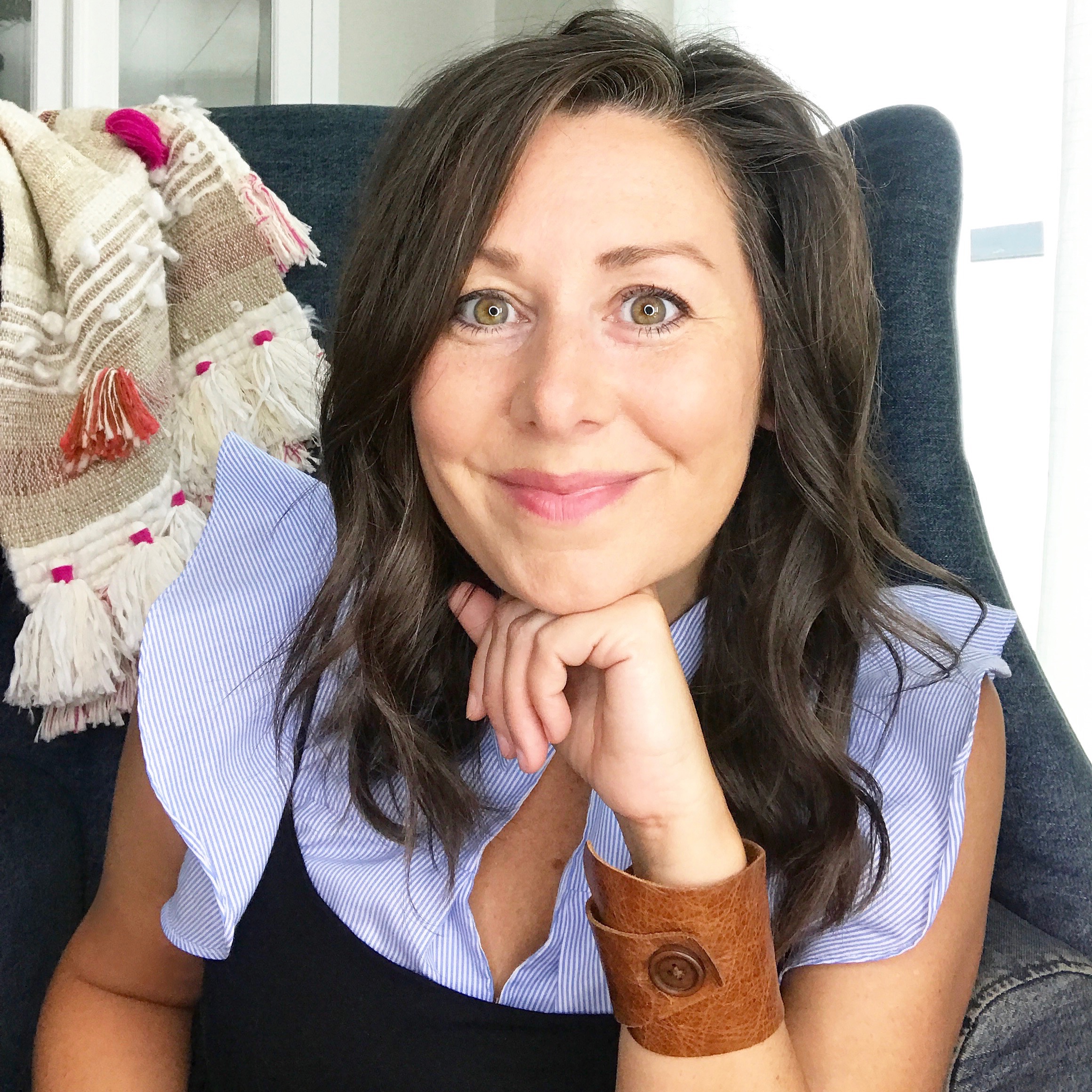 Myquillyn Smith: Well my name is Myquillyn Smith. I go by “The Nester” online because when I first got online, I was afraid of the Internet and thought, There’s no way I can put a name like Myquillyn out there. But over time I’ve learned that the Internet is a pretty amazing place. It’s one of my favorite places to hang out. I have a blog called The Nesting Place, where I encourage women in their home. I really believe if we can get our home looking the way we’ve always wanted, then we can use it the way we’ve always dreamed.
Myquillyn Smith: Well my name is Myquillyn Smith. I go by “The Nester” online because when I first got online, I was afraid of the Internet and thought, There’s no way I can put a name like Myquillyn out there. But over time I’ve learned that the Internet is a pretty amazing place. It’s one of my favorite places to hang out. I have a blog called The Nesting Place, where I encourage women in their home. I really believe if we can get our home looking the way we’ve always wanted, then we can use it the way we’ve always dreamed.
I’m a mom of three boys. Our oldest is 21, so he’s in college. We’ve got a senior in high school and a junior in high school. And I’ve been married to my husband Chad for 23 years. And he is the kind of man with a dirty job with lots of dirty boots. We’ve got a dog and two cats. So our house is very lived in, loved on and messy. But I try to keep it pretty within the mess.
A Family Legacy of Creativity
My mom always cared about our house. I always looked forward to coming home from school. I’m very much a homebody, so I think you know personalities is part of it. But home was always a safe place to be creative. We were allowed to make a mess and not clean it up, if needed. Our home was always really tidy, but I can always remember having a place in our house where, if we built like an elaborate Barbie home or neighborhood, my mom wouldn’t necessarily make us clean it up that night and pack it all away. And at the time, that just seemed normal. But now with my own kids and looking back I think, I think that really helped shape my creativity of, just being able to play. And so my mom let us do that, and I’m so grateful for that.
I consider myself creative, and I think that was part of it was just having that freedom in childhood to create to make things. I would go and my mom and dad’s room and get little tiny potted plants out of their room, and then use it in my Barbie house to be a massive plant. I just remember doing stuff like that and never questioning if I could, but just having the freedom to have fun.
My mom became a believer when I was really young. I can’t remember, maybe I was 6 or 7. And she would go to church and take us, and my sister and I became believers. And so our first big prayer was for our dad, that he would become a Christian.
We saw that prayer answered eventually when I was in seventh grade. And so I think my view of God and how He interacted with our family was very trusting. To see that answered was a big deal. When my dad was ready, then he was ready. And so lots of great things happened after that.
“My view of God and how He interacted with our family was very trusting.” Myquillyn Smith
My dad always had a teacher mindset. And so my family is really open with like their decisions like, “Okay, this is how we’re buying a car, and this is the decision that we’re making.” We always had talks like that growing up. And so when my dad became a believer, same thing. He was really really open with it. “And this is why now, this is how I think differently, and this is how God is using this, so this is what we’re praying for.”
So that was my experience growing up: when I was 13, my dad became a Christian. And our home life in some ways changed a lot, and then other ways didn’t really change. But you know, looking back, I know that changed the trajectory of our entire family.
Being Yourself Where You’re Planted
Narrator: As Myquillyn grew older and began to live in a house of her own, she found that creating the homey feeling she experienced as a child was much more difficult than she thought—especially after she moved with her husband and family more than a dozen times.
Myquillyn: Well, we’ve moved 14 times in . . . Chad and I’ve been married, again, I think 23 years, so it’s a lot of houses. And there are other good things about it. Some of the things I loved was getting to be creative in a different space and not growing tired of a space. But I think for my personality, my secret wish was always just to settle down already and stay put and make roots and make friends and not have to move again.
So in many ways, that was exhausting and not what I felt like I expected or wanted in my home life and my raising kids life and my married life. It was completely opposite of what I ever thought would happen.
Playing Barbies in our back room at our house, I realize, was not about the stories of the Barbies or the back stories or the drama. For me, it was always about setting up their home and that was the part of play that I always loved. And so as an adult that just carried over. And you know, when I was a teenager, I was moving furniture around in my room. My parents would go on vacation or have something they needed to do out of town, and so it would be my sister and I. And instead of like throwing a big raging party, I would move all their furniture around and surprise them when they got home.
And so just doing things to make home feel better has always been a part of what I do. So all of those moves, I couldn’t see where that fit. Like, it just felt wrong to me. I wanted to stay put. But I had to learn how to set up home quickly in less than perfect circumstances. Sometimes we were renting, sometimes we are in apartment. Sometimes we were able to buy a house, but we didn’t have maybe the money or the time or the resources to do exactly what I wanted.
No one’s circumstances are ever perfect when it comes to anything, and especially when it comes to home. There’s always something lacking that we wish could be different. And so instead of just waiting for the next house, it hit me that my kids are growing up, and I want our home to feel homey. So it’s time to hang the pictures on the wall. Time to put some rugs down on the floor, even if it’s not my ideal dream house or perfect space. I can make it better. And this is our home—the time is now.
“No one’s circumstances are ever perfect when it comes to anything, and especially when it comes to home.” – Myquillyn Smith
I learned through all those moves how to set up a home, how to make it homey quickly, what worked, what didn’t work, how to use different spaces. It was the best education in home I could have ever had.
Where I really learned to embrace imperfection while living in a bunch of imperfect homes. And the next house was imperfect, and the next house was imperfect. And not even having the control to maybe paint a wall. So if you’re living in a rental house, a lot of times you sign a contract saying you won’t pay the walls. I had to come to terms with, There’s going to be a lot of things I can’t do. So how can I still be okay with that? Like I could just wait and wish on the next place. But life is happening. So what can I do to embrace where I am and be inspired where I am?
“I really learned to embrace imperfection while living in a bunch of imperfect homes.” – Myquillyn Smith
When we think about what Joanna Gaines is doing and all of those photos we may see on TV or Instagram or Pinterest, she is giving us the gift of inspiration. It’s what we do with that gift that shows maybe how we feel about it and those big emotions that can be linked with that.
 If we look at a beautiful photo and we feel like we have to copy it, that’s where all of those sad, shameful, guilty feelings of, I’m never going to have that, go in. Oh, there’s that beautiful dining room. It’s got a table I can’t afford, it’s got a high ceiling that I don’t have. [We can look at that photo] as a person who wants to be inspired, which means, What can I take away from this and apply to my own home?
If we look at a beautiful photo and we feel like we have to copy it, that’s where all of those sad, shameful, guilty feelings of, I’m never going to have that, go in. Oh, there’s that beautiful dining room. It’s got a table I can’t afford, it’s got a high ceiling that I don’t have. [We can look at that photo] as a person who wants to be inspired, which means, What can I take away from this and apply to my own home?
That is work. It’s not the lazy girls lazy person’s way out. That is taking an active stance and saying, How can I apply this to my life? I love this room. What is it about this room that I love? And it might be that you love that it’s open and airy and has natural light. Maybe you need to take the blinds down in your living room. There’s little steps like that, if we’re willing to put in the work and pay attention and not just focus on what we don’t have—and I’m only saying this because I learned it the hard way of feeling so ill-content in my own house and my own situation and not wanting to be like that anymore.
“There’s little steps [to creating a cozy home] if we’re willing to put in the work and pay attention and not just focus on what we don’t have.” – Myquillyn Smith
Creating a Cozy Minimalist Home
The first book I wrote was about finding contentment in your home, and I really felt like that was all I ever had to say about house. I don’t care how you decorate. I just want you to love your home. Who cares what kind of sofa you have?
But as I was continuing to hang out in the online community, I realized, Oh, there’s so many of us who are ready to buy a sofa, and we don’t know what to do. Or really want to host the community group, but we don’t feel right about our home.
When that happens, it’s such a roadblock for us that it’s hard to move forward. We’re using real money in real time and making real decisions about what to put in our home. It doesn’t necessarily cost any more to make something pretty, but you have to know how to make these decisions.
That’s when I decided to write this book, all within the scope of cozy minimalism, which means getting the most amount of style with the least amount of stuff. So we want that balance of having plenty and coziness in our home and abundance, but also that minimal, that simplicity, that peacefulness that knowing when to say enough. And it’s not one extreme or another when you have too much coziness, it becomes clutter. When you’re too minimal it becomes cold. But there’s somewhere in between that we all fall that is a perfect balance for us in our perfect whatever time of life we’re in, whatever our family’s situation is, whatever our house situation is.
”Cozy minimalism: getting the most amount of style with the least amount of stuff.” – Myquillyn Smith
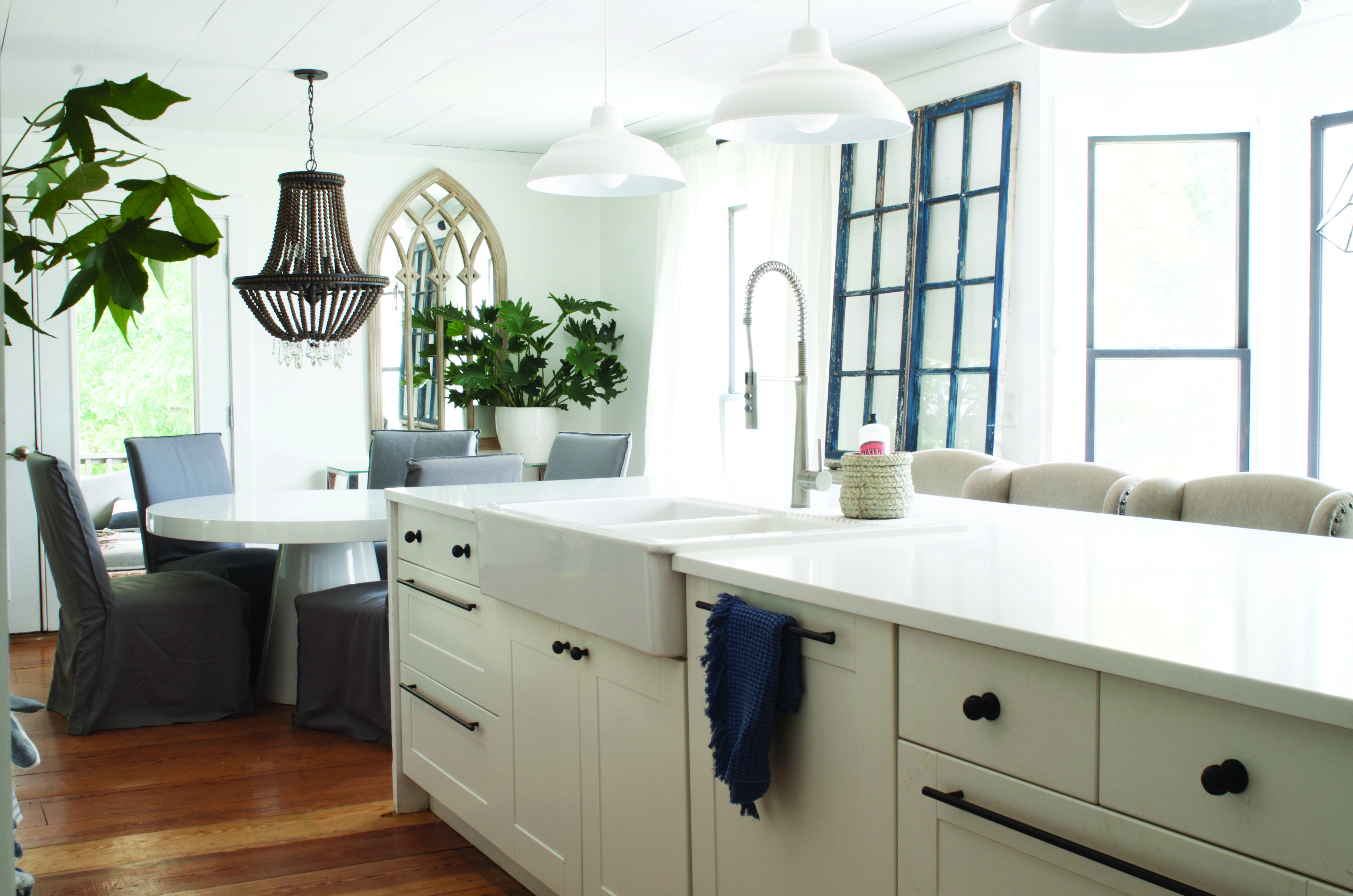 I know at different times in my life, I’ve had a higher need for abundance or a higher need for simplicity. And so cozy minimalism can kind of help you right where you are, make decisions in your home, real decorating decisions. Where do I put the sofa? How do I hang these drapes? What size rug do I get? For a long time I’m like, Oh, who cares, it’s just dumb design. But now I’m like, Oh, it’s so powerful. Because when we get our home looking the way we want it to look, we can finally use it and not have to think about it anymore. We can just volunteer it, have people over and you know use it the way we’ve always wanted to use it and be proud of that and not have to be preoccupied with it.
I know at different times in my life, I’ve had a higher need for abundance or a higher need for simplicity. And so cozy minimalism can kind of help you right where you are, make decisions in your home, real decorating decisions. Where do I put the sofa? How do I hang these drapes? What size rug do I get? For a long time I’m like, Oh, who cares, it’s just dumb design. But now I’m like, Oh, it’s so powerful. Because when we get our home looking the way we want it to look, we can finally use it and not have to think about it anymore. We can just volunteer it, have people over and you know use it the way we’ve always wanted to use it and be proud of that and not have to be preoccupied with it.
I think it’s best to start—always, always, always—one room at a time. So you never want to be working in more than one room. Now, which room? It just kind of depends on where you are. If there is one room in your life that brings you particular stress, or one room that would bring you great joy if it’s done, or maybe there’s a room it is like almost done. That would be an easy win.
I think it depends on maybe what your goal is of where to start. But I think all of us kind of know in our heart like, I really need to start with such-and-such room. That might be your family room or your bedroom or just the simplest room in your house, that if you really spent a day thinking about it and working through it, you would have that finished and you could forget about it.
I hope that women will be more confident in making decisions in their home.
 I know for me, I certainly don’t consider myself one like a decluttering expert or two a full-fledged minimalist. But I’ve always been really careful in my schedule and in my life what I say ‘yes’ and what I say ‘no’ to. But for some reason, that never carried over to my home. I always held onto things. And my reason was, Just in case. Like, I better hold on to anything like a lamp or a chair.
I know for me, I certainly don’t consider myself one like a decluttering expert or two a full-fledged minimalist. But I’ve always been really careful in my schedule and in my life what I say ‘yes’ and what I say ‘no’ to. But for some reason, that never carried over to my home. I always held onto things. And my reason was, Just in case. Like, I better hold on to anything like a lamp or a chair.
I look back and I think it was a trust issue of, I have this now. I’m so responsible. I will keep this thing forever just in case. But also I think part of it was not trusting that God would provide it later. Like, I better hold onto this because who knows what’s going to happen in the future. And I think that was a big trust issue for me.
A Routine of Prayer
I have a chair in the corner of our family room, and it’s positioned great because you can’t see the TV from that chair, even if it’s on. We call it “the introvert chair.” It has this extreme wing back, so when you sit back in it, the world is kind of muffled. It’s really nice. So when everyone’s home, especially in summer, I feel like I can sit back in that chair and kind of enter a quieter world.
I’ve got a basket right next to my chair. It’s got my journal, day planner type of things. It’s got some cookbooks, and it’s got our Jesus Calling copy, where the binding is all broken. It always flips over to the same page, as it’s been broken up so many times.
And so a lot of times, unless the weather is magnificent, I will sit and read a little bit. Whether or not I’m praying in that chair depends on what the family is doing. But I think it’s important to set up places for specific things like that in our life. There’s something about having that routine and having that place to go. And it can be super simple, like, just having a chair, having a lamp so that you can see, having a basket, if your stack of books are going to bother you. For me to be able to throw everything in a basket not have to look at it, but maybe it’s cluttered in the basket but not out in real life—all of those things help me to be able to have that practice and be able to sit in my chair every morning and have a time of quiet and reading and thinking and just getting in touch with God and being encouraged and really setting my whole day.
I’ll tell you one thing I like about Jesus Calling is because it’s simple and it’s short. I don’t have to figure out what to do because sometimes just having a time of quiet in my day and getting over that hurdle of like, Yes, I’m going to do that—if I have to figure out what it is I’m going to read or what journey through the Bible I’m going to keep up with, that’s enough roadblock for me to be like, Oh, put it off. I’ll do it later. But if I know I can just open up my Jesus Calling and read that day and get it done in like two or three minutes, the hurdles are gone and I’m more apt to do it. That’s one of the things that has really been helpful for me.
“One thing I like about Jesus Calling is because it’s simple and it’s short.” – Myquillyn Smith
Jesus Calling on August 4th:
Hold My hand, and walk joyously with Me through this day. Together we will savor the pleasures and endure the difficulties it brings. Be on the lookout for everything I have prepared for you: stunning scenery, bracing winds and adventure, cozy nooks for resting when you are weary, and much more. I am your Guide, as well as your constant Companion. I know every step of the journey ahead of you, all the way to heaven.
You don’t have to choose between staying close to Me and staying on course. Since I am the Way, staying close to Me is staying on course. As you focus your thoughts on Me, I will guide you carefully along today’s journey. Don’t worry about what is around the next bend. Just concentrate on enjoying My Presence and staying in step with Me.
It’s beautiful.
Narrator: To learn more about Myquillyn and her new book Cozy Minimalist Home, please visit thenester.com.
Narrator: Next time on the Jesus Calling Podcast, we visit with Christian artist and songwriter David Crowder. After years of massive success with the David Crowder*Band, David shares why the band made a decision to part ways, during one of their most prolific seasons.
David Crowder: If you didn’t have the economy of faith, it makes no sense. Because in the economy that we were breathing in and out every day, we were right where you’ve worked really hard to be. But I would rather my wife be next to me and thrilled and happy and full of life than have a number-one record.
